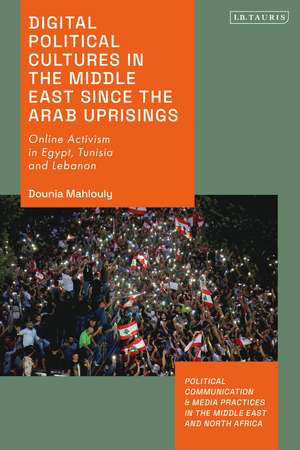Digital Political Cultures in the Middle East since the Arab Uprisings: Online Activism in Egypt, Tunisia and Lebanon: Political Communication and Media Practices in the Middle East and North Africa
Autor Dounia Mahloulyen Limba Engleză Hardback – 14 iun 2023
Preț: 509.76 lei
Preț vechi: 730.81 lei
-30% Nou
Puncte Express: 765
Preț estimativ în valută:
97.59€ • 100.42$ • 82.26£
97.59€ • 100.42$ • 82.26£
Carte tipărită la comandă
Livrare economică 28 februarie-14 martie
Preluare comenzi: 021 569.72.76
Specificații
ISBN-13: 9780755645176
ISBN-10: 0755645170
Pagini: 208
Ilustrații: 10 bw illus
Dimensiuni: 156 x 234 mm
Greutate: 0.47 kg
Editura: Bloomsbury Publishing
Colecția I.B.Tauris
Seria Political Communication and Media Practices in the Middle East and North Africa
Locul publicării:London, United Kingdom
ISBN-10: 0755645170
Pagini: 208
Ilustrații: 10 bw illus
Dimensiuni: 156 x 234 mm
Greutate: 0.47 kg
Editura: Bloomsbury Publishing
Colecția I.B.Tauris
Seria Political Communication and Media Practices in the Middle East and North Africa
Locul publicării:London, United Kingdom
Caracteristici
Considers both the 2011 Arab uprisings, and the second wave of protests, including the attempted revolution in Lebanon in 2019
Notă biografică
Dounia Mahlouly is a Lecturer (Assistant Professor) at SOAS, University of London, where she convenes postgraduate courses on Global Media Theory, Digital Humanities and Political Communication. She has published peer-reviewed articles, book chapters, and research reports on media in North Africa with a number of publishers and the academic journal Information, Communication & Society. Dounia Mahlouly is also the founder of the non-profit Middle East Research Hub (MERH).
Cuprins
List of Figures 1. 1. Introduction 2. 2. From Utopia to Dystopia3. 3. From the Emergent to the Mainstream: The Cycle of Discursive Power 4. 4. Emergent Media in Post-Revolutionary Tunisia and Egypt: A Study of Blogosphere 5. 5. Mass-Media Campaigning on Twitter: Egypt and the 2012 Egyptian Constitution 6. 6. Making Sense of the Revolution: Debating Online Ober the 2012 Egyptian Constitution7. 7. Looking back at the Revolution: Gathering Impressions from the Field after the 2013 Military Coup8. 8. The Agenda of Global Security and its Implication for Independent Media9. 9. Lebanon: Before, During and After the 2019 Revolution 10. 10. Conclusion: The Media as a Bridge Between the Political Theory and Political Praxis of the RevolutionBBibliographyAppendices
Recenzii
This book provides a compelling argument about the role of informal communicative practices in oppositional and contentious politics in the Middle East and North Africa. Drawing on empirical evidence from Egypt, Tunisia and Lebanon, it offers a nuanced and critical understanding of how cultures of informal politics expressed through peripheral communication channels are crucial to emerging politics and transformation, highlighting the urgent need to refocus attention on agency in the so-called post-truth age. The book is a timely critical contribution to the emerging scholarship on political communication theory and practice in the non-Western world.
Dounia Mahlouly explains why citizen protests and civil society uprisings have been frustrated in the region in the past decade. Digital connectivity often reduces the chances of a revolution achieving sustainable goals. This book shows activists' political creativity has been consistently outmanoeuvred or undone by the state or by wider structural forces. But Mahlouly's rich interviews and ethnography provide evidence for why this creativity will not disappear -- and what can be learnt from a decade of endeavour
This book is a must-read for anyone interested in the interplay of digital media and Middle Eastern politics. Offering rich, insightful, comparative case studies of recent revolutionary movements in Tunisia, Egypt and, Lebanon, Dounia Mahlouly analyses the discursive cycles of revolution and counter revolution. She examines the dialectic between hegemonic and counter hegemonic forces as revolutions emerge, subside and/or become reappropriated by state and other actors. She presents a powerful defence of human and audience agency confronted as they are with populist politics, alongside a measured sociological account of the tensions between young pro-revolutionary and grassroots groups that provoke fundamental questions about class, representation and legitimacy. An absolutely compelling read
Dounia Mahlouly's Digital Political Cultures in the Middle East since the Arab Uprisings Online Activism in Egypt, Tunisia and Lebanon advances the study of digital communication in the MENA region beyond simplistic narratives. Its analysis of discourse, agency and hegemony synthesizes and contributes to key debates in the field of media and communications more broadly.
Dounia Mahlouly explains why citizen protests and civil society uprisings have been frustrated in the region in the past decade. Digital connectivity often reduces the chances of a revolution achieving sustainable goals. This book shows activists' political creativity has been consistently outmanoeuvred or undone by the state or by wider structural forces. But Mahlouly's rich interviews and ethnography provide evidence for why this creativity will not disappear -- and what can be learnt from a decade of endeavour
This book is a must-read for anyone interested in the interplay of digital media and Middle Eastern politics. Offering rich, insightful, comparative case studies of recent revolutionary movements in Tunisia, Egypt and, Lebanon, Dounia Mahlouly analyses the discursive cycles of revolution and counter revolution. She examines the dialectic between hegemonic and counter hegemonic forces as revolutions emerge, subside and/or become reappropriated by state and other actors. She presents a powerful defence of human and audience agency confronted as they are with populist politics, alongside a measured sociological account of the tensions between young pro-revolutionary and grassroots groups that provoke fundamental questions about class, representation and legitimacy. An absolutely compelling read
Dounia Mahlouly's Digital Political Cultures in the Middle East since the Arab Uprisings Online Activism in Egypt, Tunisia and Lebanon advances the study of digital communication in the MENA region beyond simplistic narratives. Its analysis of discourse, agency and hegemony synthesizes and contributes to key debates in the field of media and communications more broadly.





